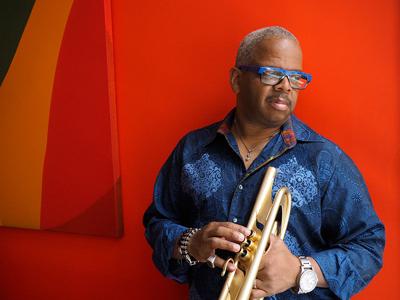Trumpeter and composer Terence Blanchard and director Spike Lee have had a productive relationship that spans more than 30 years. Blanchard has composed scores for more than a dozen of Lee’s films and won a Best Instrumental Composition Grammy Award for “Blut Und Boden (Blood and Soil),” which was on the soundtrack for Lee’s 2018 film “BlacKkKlansman.”
Blanchard has gotten used to Lee enlisting him on new projects on short notice.
“We were at the Oscar party (for 'BlacKkKlansman'), when he asked me about doing ‘Da 5 Bloods,’” Blanchard says. “He was leaving to film in Vietnam the next day.”
“Da 5 Bloods” is Lee’s latest movie, released June 12 on Netflix. It’s one of two current releases featuring Blanchard, though in the “Up From the Streets” film about New Orleans music and culture, he’s on screen as the narrator.
“Da 5 Bloods” is an action movie in which four black Army veterans return to Vietnam to search for the remains of their former friend and squad leader Stormin’ Norman (Chadwick Boseman), but they have another mission as well. While battling Vietnamese forces, they discovered and hid a cache of gold bars. After decades, they think they’ll be able to locate it using satellite images. And while the trip at first seems like a chance at catharsis — to reunite with each other and recover their fallen friend’s remains — they have changed over the years and inevitably old wounds are reopened.
Lee places the film in the history of racism and the war and military. It opens with interview footage of Muhammad Ali talking about his refusal to fight for the U.S., noting that the Vietnamese never referred to him with racial epithets. The film also references Crispus Attucks, a black man who was the first casualty of the American Revolution. Lee recreates propaganda radio broadcasts by “Hanoi Hannah,” in which she asks black servicemen why they fight for a nation plagued by systemic racism. The soundtrack includes Marvin Gaye songs that address inequality and the desire for social change. Blanchard composed 21 pieces for the score, which was released May 29 on Milan Records.
“Up From the Streets” celebrates a wide array of New Orleans music and puts it in historical context. That history starts with Congo Square and the legal assembly of enslaved people to play their own music in colonial Louisiana. As many musicians, including Wynton Marsalis, and experts including former Tulane University jazz archivist Bruce Raeburnpoint out, that music became the foundation of jazz and much of New Orleans — and thus much of American — music.
The film highlights many musicians one would expect: Buddy Bolden, Louis Armstrong, Jelly Roll Morton, Fats Domino, Mahalia Jackson, Allen Toussaint, Irma Thomas, Professor Longhair, James Booker and members of the Neville family. It also lauds drummer Earl Palmer and Louis Moreau Gottschalk. The array of current artists includes Mannie Fresh, Lil Wayne, Big Freedia, Juvenile, Galactic, Tank and the Bangas and others.
Director Michael Murphy takes an overly broad approach, however, and the narrative breezily hops from one genre and time period to another. Many interview subjects talk about music bringing people together to second line with brass bands, and the film doesn’t attempt to reconcile that sentiment with historical divides it mentions, such as struggles over segregation, school integration or the Supreme Court case Plessy v. Ferguson.
Blanchard shares a memory of the Gen. P.G.T. Beauregard statue being removed from Esplanade Avenue at the entrance to City Park. He says that he passed the statue regularly on his way to school for years, and it was only after it was removed that he noticed what it felt like being relieved of the burden. That moment in the film resonates in view of recent protests about the killing of George Floyd, police brutality and inequality.
“That story itself goes to what we’ve been going through,” Blanchard says. “Some people have been blind to these issues and don’t realize they’ve built up a tolerance to injustice. But it’s like there’s a new emotion now. When you feel it, it’s like it’s a different thing now.”


